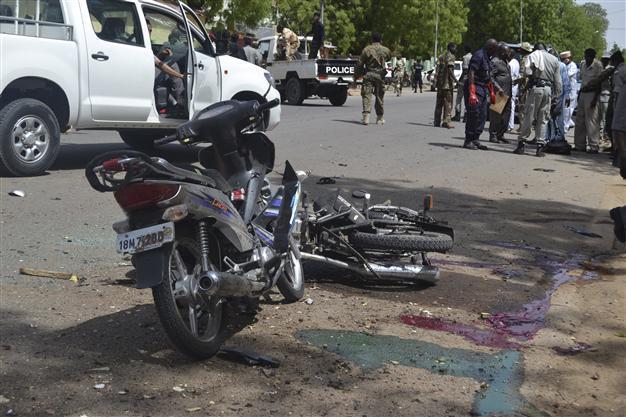Security officers stand at the site of a suicide bombing in Ndjamena, Chad, June 15, 2015. Reuters Photo
Twenty-three people were killed and over 100 injured in twin suicide bombings targeting police in the Chadian capital June 15, with the government blaming Boko Haram militants for the bloodshed.
They were the first such attacks in the capital of the central African nation, which has been on the frontline of the regional fight against the Nigerian Islamist group.
"Boko Haram chose the wrong target. These lawless and faithless terrorists will be flushed out and neutralised wherever they are," the government said in a statement.
It said 23 people were killed and another 101 wounded in the simultaneous bombings outside the police headquarters and police academy in N'Djamena.
It said four "terrorists" were also killed, but did not give details. Earlier, a police official had told AFP that two suicide bombers carried out the attacks, which came as police cadets were attending a training course at the academy.
There was no immediate claim of responsibility but French President Francois Hollande also accused Boko Haram militants of being behind the "barbaric attack".
"There is no doubt that Boko Haram is responsible and will be brought to justice for this new humanitarian horror," Hollande said during a visit to Algiers where the regional threat posed by jihadists was high on the agenda.
Chad, a former French colony, is a close ally of France in its counter-terrorism Operation Barkhane in the Sahel region and the French army has set up its headquarters for the campaign in N'Djamena.
The Chadian government said the situation was quickly brought under control June 15, but the rare assault on the capital prompted the creation of a "crisis cell" and vehicles with darkened windows were banned from N'Djamena.
Chadian security forces were also seen taking up positions on the streets.
President Idriss Deby was expected to return home during the day from an African Union summit in Johannesburg, an official said.
In his absence, government ministers held a crisis meeting to discuss the bombings.
The former French colony is part of a four-nation coalition also including Nigeria, Cameroon and Niger that was created to tackle the Boko Haram insurgency after the group stepped up cross-border attacks.
Boko Haram leader Abubakar Shekau has on several occasions threatened to attack Chad and other countries in the coalition.
UN Secretary-General Ban Ki-moon, in a statement, condemned the June 15 twin attacks and praised Chad "for its courageous role in the fight against Boko Haram".
He also welcomed progress on sending an African Union-backed multi-national force to tackle the rebels.
Last week, Abuja hosted a summit where Nigeria and fellow coalition members plus Benin rubber-stamped an 8,700-strong regional force to replace the current four-nation grouping.
The long-awaited Multi-National Joint Task Force, which had originally been due to become operational in November, has its headquarters in N'Djamena, under a senior Nigerian officer.
Boko Haram has been waging a six-year campaign of violence in northeastern Nigeria that has left at least 15,000 people dead and increasingly spilled across borders.
Chad's involvement in the fight against Boko Haram began in January when Deby sent troops to assist neighbouring Cameroon, whose far northern region was coming under attack from the rebels.
More than 70 Chadian soldiers have died in operations against the Islamists, including attacks around Lake Chad where the borders of Nigeria, Chad, Cameroon and Niger meet.
Nigeria's new President Muhammadu Buhari, who has vowed to make crushing Boko Haram a priority, visited Chad and Niger earlier this month to build up the regional coalition against the Islamists.
"Boko Haram declared that they are in alliance with ISIL [Islamic State of Iraq and the Levant], so terrorism has gone international. They are in Mali, they are in Nigeria, they are in Syria, they are in Iraq, they are in Yemen," he told AFP at the summit in South Africa on June 15.
"It's an international problem now," he said.
Boko Haram, whose name roughly translates as "Western education is forbidden", aims to create an Islamic caliphate in the territories it controls and earlier this month declared allegiance to the ISIL group.
